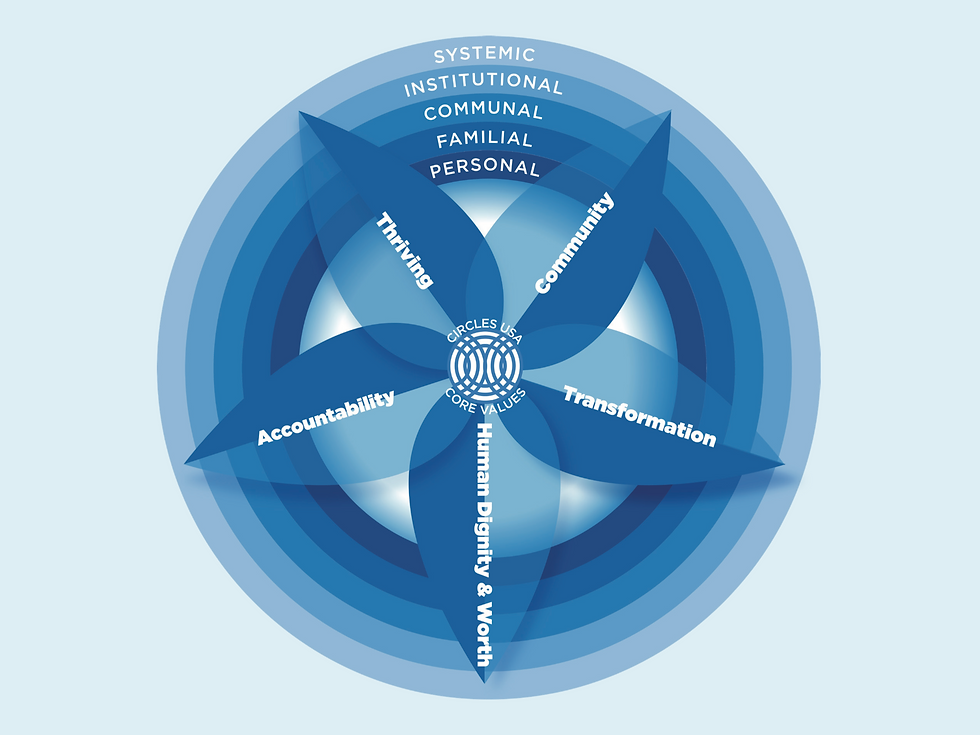Chapters Tackle the Cliff Effect, Pt. Two: Circles Salt Lake, UT
- Dec 2, 2022
- 3 min read
Updated: Sep 24, 2024
CUSA chapters and Big View teams across the US are tackling one of the most pressing obstacles for families working to escape poverty: the Cliff Effect.
The Cliff Effect phenomenon occurs when a pay raise at work triggers a disproportionate loss of government assistance. Even a small raise can “push people off the cliff” when it comes to benefits. Suddenly ineligible for subsidized food, housing, healthcare, or childcare, the family is worse off than before receiving the raise. In 2020, Circles USA Board Chair Joan Kuriansky authored a Policy Platform identifying the Cliff Effect as one of six key issues affecting people and communities experiencing poverty.
In this blog series, we aim to:
Introduce chapters and Big View teams taking bold, innovative actions to alleviate the Cliff Effect in their communities; and
Resource readers by sharing Big View media to help educate and mobilize your own communities.

Circles Salt Lake, led by Executive Director Michelle Crawford, organized a hybrid panel discussion in early October to address the Cliff Effect. The talk was moderated by Salt Lake County Councilwoman Aimee Winder Newton, who also chairs the county’s Poverty Intergenerational Task Force. Participants—mainly single or separated parents who had seen their incomes rise from 0 to 90% or more of federal poverty guidelines in Circles—talked about the difficulties of navigating Medicaid’s website to calculate benefits thresholds; the frustration of turning down job promotions to maintain an unstable financial status quo; and how small income gains can result in even bigger losses.
Kristie, a panelist and veteran Circle Leader, described how a minor pay raise triggered a catastrophic loss of benefits for her family. “I was making $9 an hour. Then I got a different job,” she recalled. “It only paid $2 more. And it made me lose everything. I made $320 more [per month], and I lost all of that help. There was no warning. There was no ‘okay, you’ve got one more month’. It was instant.

The support Chris’s family lost included food stamps, medical supplements, and day care for her children. Eventually, she said, extra expenses incurred by the cliff effect cost her her home and job.
Chris’s story underscores how small pay raises, which may seem like “drops in the bucket,” often render low-income workers ineligible for a host of services crucial to staying housed and employed.
Circles Salt Lake panelists described their strategies to offset or avoid cliff effect impacts, such as enrolling their kids in financial literacy programs. Circles Salt Lake ED Michelle Crawford, meanwhile, traveled to Washington, DC for a legislative conference with the chapter’s local chamber of commerce to address the cliff effect with policymakers.
“I am leading myself in one way,” said Kristie, “by encouraging others that are downtrodden to know that they can get out of the depths of the vicious cycle of the cliff effect, and teach them to share their stories. We need to know the complete truth of all these things.”
Winder Newton commented, “It’s awesome that these women are willing to talk to us today and share their personal stories. We hope we can share this panel with policymakers who can make a difference.”
Additional resources:




Comments